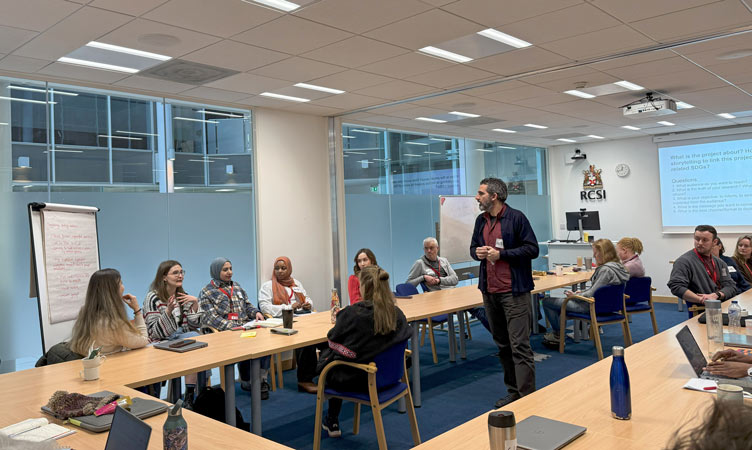Achieving the Sustainable Development Goals (SDGs) requires more than scientific discovery, it demands meaningful communication that connects research with real-world change.
At RCSI, we recognise that tackling today’s most urgent health and development challenges means telling the story of research in ways that resonate with policymakers, practitioners and communities alike.
From health equity to gender inequality, many of the barriers to progress on the SDGs are deeply human.
That’s why storytelling is emerging as a critical tool for researchers – not just to disseminate findings, but to bring complex issues to life, build empathy and drive action.
Understanding human realities
In Malawi, where access to timely cancer care remains a major health challenge, an RCSI-led project is using patient stories to understand the human experience behind the statistics – and to inform how we deliver better services.
In recent months, RCSI researchers travelled to Malawi to interview women undergoing breast cancer treatment to capture their experiences navigating care. One patient’s interview stood out: despite the debilitating effects of chemotherapy, she welcomed the team into her home, sharing openly the emotional journey from discovery of symptoms to diagnosis and treatment.
Her living room, filled with personal mementos and signs of a life fully lived, contrasted with the harsh realities of her illness.
Her experience prompted reflection on how researchers communicate the complexity of illness and care and the importance of telling stories in all their nuance. Behind many data points lies a complex, human experience. Study participants share their insights and, at times, their most intimate details.
Making research matter
The experience in Malawi sparked a broader conversation at RCSI about how we communicate research. Earlier this year, we hosted a workshop to explore storytelling as a tool for research impact. The event brought together staff, students and civil society collaborators to reflect on how stories can bridge the gap between data and decision-making, particularly in the context of the SDGs.
Storytelling, as explored in the workshop, is not about simplifying complex science. It is about making that complexity accessible and motivating action. As HIV activist, researcher and human rights advocate, Robbie Lawlor told participants: “In research, we spend so many years of our lives dedicated to trying to make sense of the world, to better it, to enrich it ... researchers cannot expect to hide behind their papers and hope they will be used as scripts – we must be proactive.”
Lawlor challenged participants to think beyond traditional research outputs, and to consider how to engage with issues like stigma, intellectual property, and access to medicines. “How do we achieve SDG 3.3 if we do not talk about the intersections of international development and gender inequality?” he asked. “Through the art of storytelling, in all its various forms, we can make these complex interplays digestible and inspire hope of change.”
Dearbhla Glynn, a storyteller across many mediums (filmmaker, journalist, photographer and yoga instructor), also emphasised the need for collaboration across disciplines. “As we are living in increasingly polarising times, we need more unity amongst people who are trying to create change,” she said.
By partnering with storytellers, artists and advocates, researchers can widen the circle of people who understand and support their work, crucial in building the momentum needed to achieve the SDGs.
A new approach
The storytelling workshop marked an important move toward embedding narrative practice into RCSI’s research culture. Participants left with a shared sense of purpose and practical tools for communicating complex health research with greater clarity, empathy and impact.
The workshop also opened the door to future collaborations with civil society and the creative sector, laying a foundation for more inclusive and impactful research communication.
A call to the research community
The need for effective, empathetic research communication extends far beyond one institution. As we work to deliver on the SDGs, researchers across all fields are called to do more than produce knowledge – we must connect it to the people and systems it is meant to serve.
By telling stories with humility, care and purpose, we can ensure our research doesn’t just stay on the page – it moves people and drives change.
This engagement workshop was organised by Dr Chiara Pittalis, Antonio Jaén Osuna and Dr Jakub Gajewski from the RCSI School of Population Health, with the generous support of the RCSI Societal Impact and Engagement Fund 2024 and support from RCSI’s Communications Department.
RCSI is committed to achieving a better and more sustainable future through the UN Sustainable Development Goals.
![]()
![]()


